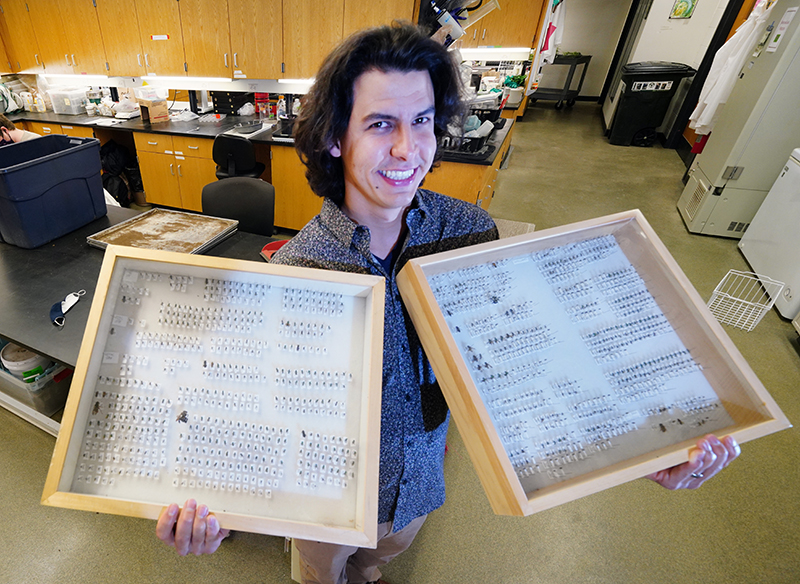The student
Jacob Pecenka’s hometown of Mitchell, South Dakota, is known as a stop on the interstate to Mount Rushmore and home to The World’s Only Corn Palace. Pecenka’s interest in biology started early, through nature walks and fishing. While earning a BS in biology and biotechnology at South Dakota State University, he discovered entomology during a summer job with a USDA scientist. “His looking at insects as working with us and not against us was something I instantly clicked with,” Pecenka says. “It wasn’t particularly exciting work — sweep netting, counting bugs on soybean leaves. But I saw the application in this world of research, a world I’d never been aware of.” Pecenka stayed on at SDSU for a master’s degree, studying cattle grazing management’s effect on dung beetles. In investigating potential PhD programs, he compiled “a short list of people doing interesting stuff.” On that list was Purdue Professor of Entomology Ian Kaplan, who Skyped with Pecenka from a sabbatical in the Netherlands about work that focused on pest management and pollinator preservation in specialty crops. Pecenka moved to Indiana in May 2017 to begin a doctoral program under Kaplan’s guidance. “My work now is more popular with my wife,” he adds, noting he now brings home honey and watermelons instead of manure-encrusted shoes.
The research
In his multi-year project Pecenka has evaluated how an integrated pest management (IPM) approach to growing watermelons in Indiana affects the ability of wild and managed bees to provide pollination to produce fruit. Indiana production of the high-value crop ranks fifth in the U.S., and growers are challenged to balance controlling pests and conserving pollinators. Using plots at Purdue Agricultural Centers (PACs) statewide, Pecenka compared the effect of regular spraying versus scouting for the striped cucumber beetle and spraying only when the number of pests per plant exceeded five (the threshold shown to lower yield). Holding off spraying is “a risky thing to ask a grower to do,” Pecenka acknowledges. “Many have the mindset of putting out insecticides as an insurance policy that no critters will munch on their crops.” His research showed the scouted plots did have more beetles — but also more pollination and higher yields.
Opportunities
Pecenka credits Kaplan with encouraging him to interact with Indiana fruit and vegetable growers, beekeepers, Extension faculty, weed and soil scientists, and researchers from other disciplines through courses, webinars, and conferences like the Indiana Horticulture Congress. “By giving me a chance to talk to growers, I’ve learned what is important to share and how to share it,” Pecenka says.
Future plans
After completing his PhD in the coming year, “I would like to continue to continue to do applied research, answering pressing questions for growers at a university or government agency,” Pecenka says. He and his wife enjoy family walks with their daughters, ages 3 months and 2 years, and dog. They also appreciate one obvious benefit of his research: “The 2-year-old and the dog like watermelon, so I have to share,” he says.
